Unit 1 Lesson 3 Getting to Know You课件+音频(共20张PPT)冀教版英语八年级上册
文档属性
| 名称 | Unit 1 Lesson 3 Getting to Know You课件+音频(共20张PPT)冀教版英语八年级上册 |
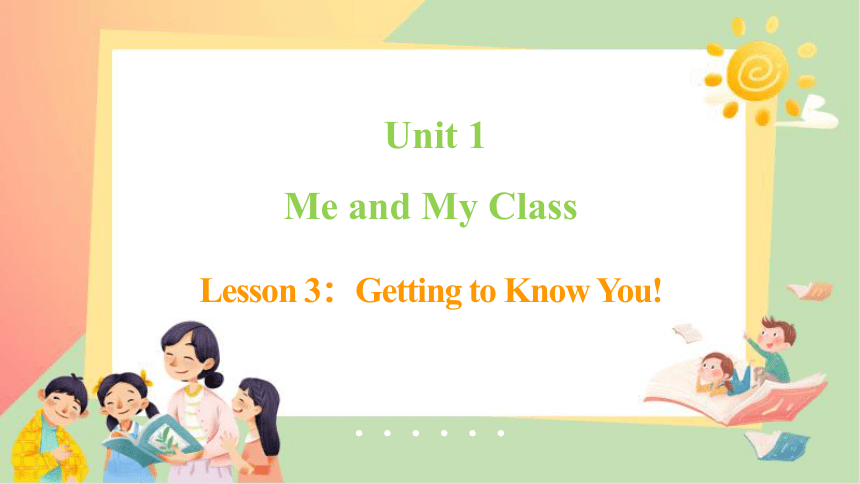
|
|
| 格式 | pptx | ||
| 文件大小 | 7.7MB | ||
| 资源类型 | 教案 | ||
| 版本资源 | 冀教版 | ||
| 科目 | 英语 | ||
| 更新时间 | 2024-07-20 10:15:49 | ||
图片预览

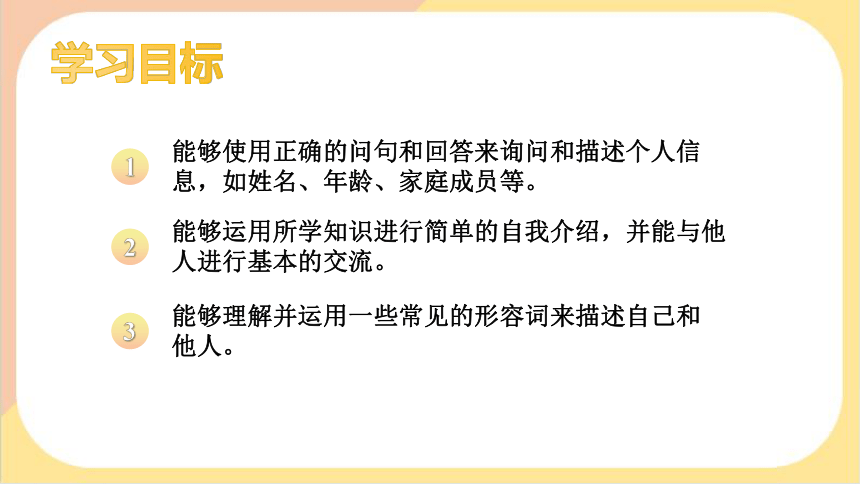
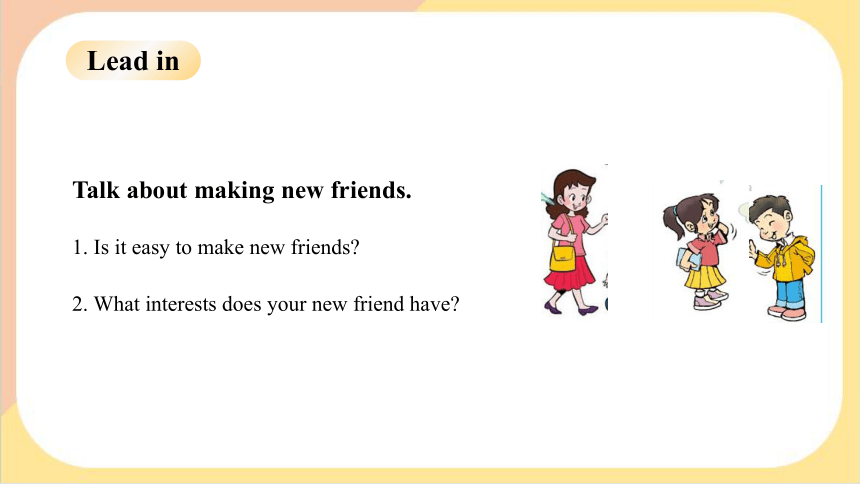
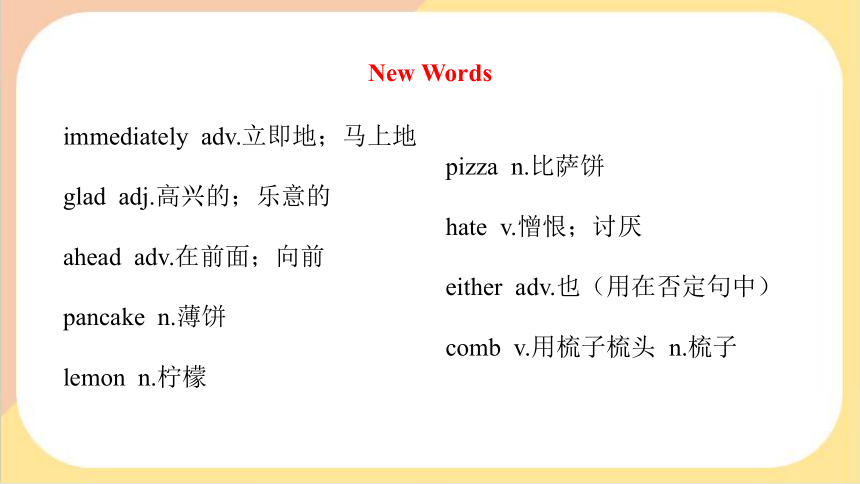

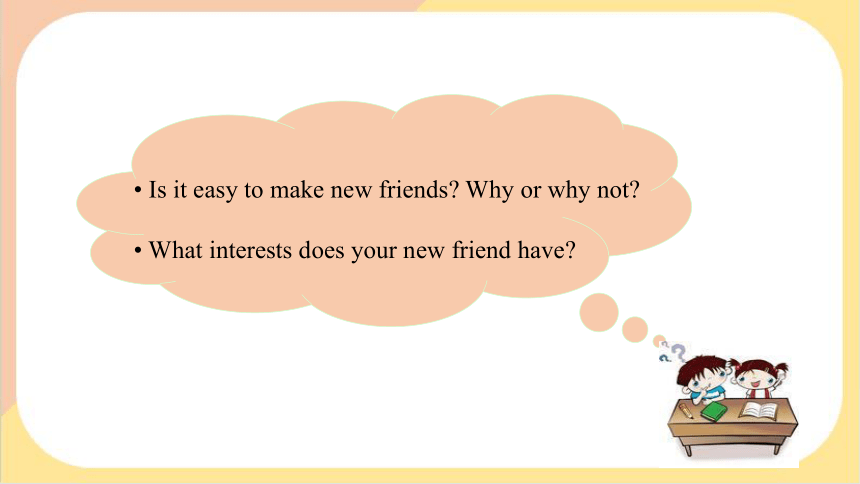
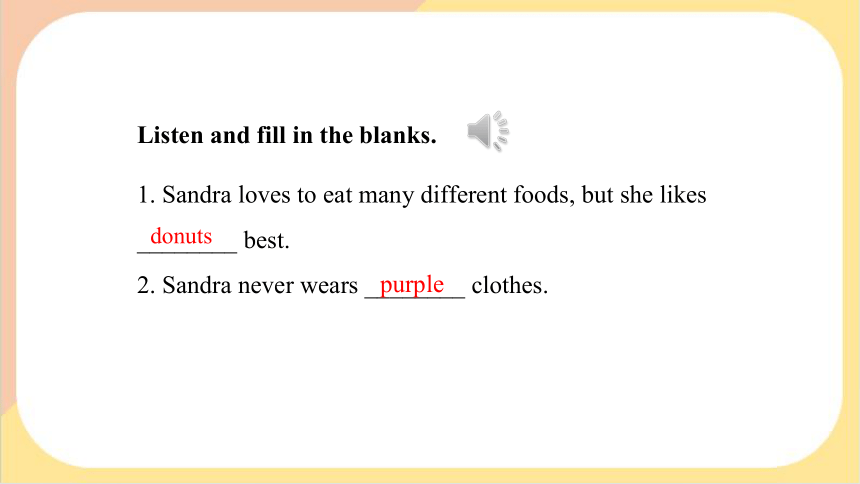
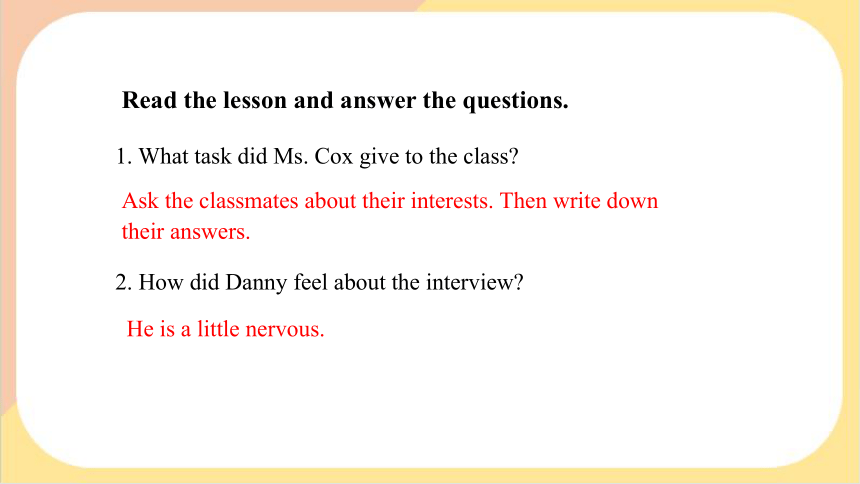
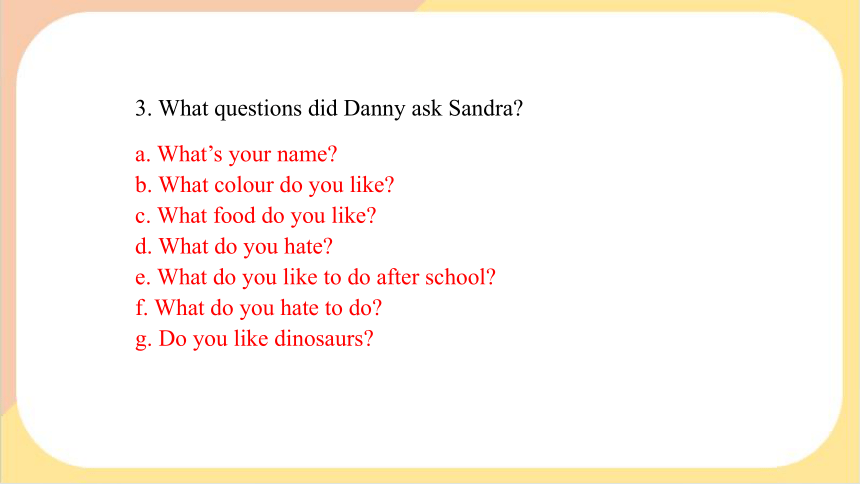
文档简介
(共20张PPT)
Unit 1
Me and My Class
Lesson 3:Getting to Know You!
学习目标
1
2
3
能够使用正确的问句和回答来询问和描述个人信息,如姓名、年龄、家庭成员等。
能够运用所学知识进行简单的自我介绍,并能与他人进行基本的交流。
能够理解并运用一些常见的形容词来描述自己和他人。
Talk about making new friends.
1. Is it easy to make new friends
2. What interests does your new friend have
Lead in
immediately adv.立即地;马上地
glad adj.高兴的;乐意的
ahead adv.在前面;向前
pancake n.薄饼
lemon n.柠檬
pizza n.比萨饼
hate v.憎恨;讨厌
either adv.也(用在否定句中)
comb v.用梳子梳头 n.梳子
New Words
Read and find the answers:
1. What does Miss Cox want Danny, Brian and Jenny to do
She wants them to talk to a classmate and write about him or her.
2. Who does Danny want to talk to/interview
Sandra.
新课讲授
Is it easy to make new friends Why or why not
What interests does your new friend have
1. Sandra loves to eat many different foods, but she likes ________ best.
2. Sandra never wears ________ clothes.
donuts
Listen and fill in the blanks.
purple
1. What task did Ms. Cox give to the class
2. How did Danny feel about the interview
Read the lesson and answer the questions.
Ask the classmates about their interests. Then write down their answers.
He is a little nervous.
3. What questions did Danny ask Sandra
a. What’s your name
b. What colour do you like
c. What food do you like
d. What do you hate
e. What do you like to do after school
f. What do you hate to do
g. Do you like dinosaurs
Language points
1. Boys and girls, please ask your classmates about their interests.
男孩女孩们,请问一问你同学们的兴趣爱好。
【探究】
interest n. 兴趣,爱好
v. 使……感兴趣
Eg: Peter’s interest is playing football. He likes it very much.
I think the book may interest Eric.
【辨析】
interesting adj. 有趣的,常用来修饰事物
interested adj. 感兴趣的,常用来修饰人,其后常接介词in,构成be interested in,意为“对……感兴趣”。
Eg: Did you go anywhere interesting
I’m not interested in sport.
2. Then write down their answers.
然后写下他们的答案。
【探究】
write down 是一个由“动词+副词”构成的动副短语,当所接宾语为代词时,要置于write和down中间;当所接宾语为名词时,置于down的前后均可。
Eg: This is my telephone number. Can you write it down
You can write down your feelings.
3. What do you hate
你讨厌什么?
【探究】
hate sb./ sth.:讨厌某人/某物
hate to do/ hate doing:讨厌做某事
Eg: I hate Monday mornings.
I hate being stuck at home all day.
4. I like to play the violin.
我喜欢拉小提琴。
【辨析】
play后接乐器类名词时,乐器类名词前必须加定冠词the。
play后接球类或棋类名词时;球类或棋类名词前不加冠词。
Eg: He is learning to play the guitar.
Let’s play basketball after school.
They don’t play chess together any more.
5. I don’t like rain either.
我也不喜欢雨。
【探究】
either:也(用在否定句中)
Eg: Pete can’t go and I can’t either.
【辨析】
either:表示“也”,一般只用于否定句,放在句末,常用逗号与前面的句子隔开。
too:表示“也”,一般用于肯定句或疑问句,放在句末,常用逗号与前面的句子隔开。
also:表示“也”,一般用于肯定句,位于系动词、助动词或情态动词之后,实义动词之前。
Listen to Danny's report and circle the words in the chart.
All about Sandra
She likes... She doesn't like... She likes to... She hates to...
green red foods Fruit dinosaurs rain snow Mondays pink clothes purple clothes play the piano play the violin ride a bike go for walks set the table
comb her hair
get up early
1
Fill in the blanks with the words or phrase in the box.
hate glad go ahead either
1.A:Do you mind if I open the window?
B:No,________.
2.I ________ going to the movie theatre alone.
3.A:I can't swim.
B:I can't swim ________.
After travelling all summer,I was ________ to
come home.
go ahead
hate
either
glad
3
like hate like to do hate to do
A
B
C
D
Learn something new about your classmates. Talk to three or four of your classmates. Write sown their answers in a chart.
Questions you can ask:
What things do you like/ hate
What do you like/ hate to do
Project
当堂检测
1. Ann is my best friend. She can play _____ piano very well.
A. / B. a C. the D. an
2. —Can I ask you some questions, Mr. Wang
—Sure, _____.
A. that’s right B. go out
C. go ahead D. that’s all right
3. It is too hard for Mr. Li to finish the work in a week. He needs _____ days.
A. more two B. two more
C. two another D. another more
C
C
B
4. The boy is _____ nervous when he speaks in front of the class because he is shy.
A. a lot of B. little
C. a little D. much
5. Jack doesn’t like oranges. His brother doesn’t like them, _____.
A. too B. also C. either D. to
C
C
Unit 1
Me and My Class
Lesson 3:Getting to Know You!
学习目标
1
2
3
能够使用正确的问句和回答来询问和描述个人信息,如姓名、年龄、家庭成员等。
能够运用所学知识进行简单的自我介绍,并能与他人进行基本的交流。
能够理解并运用一些常见的形容词来描述自己和他人。
Talk about making new friends.
1. Is it easy to make new friends
2. What interests does your new friend have
Lead in
immediately adv.立即地;马上地
glad adj.高兴的;乐意的
ahead adv.在前面;向前
pancake n.薄饼
lemon n.柠檬
pizza n.比萨饼
hate v.憎恨;讨厌
either adv.也(用在否定句中)
comb v.用梳子梳头 n.梳子
New Words
Read and find the answers:
1. What does Miss Cox want Danny, Brian and Jenny to do
She wants them to talk to a classmate and write about him or her.
2. Who does Danny want to talk to/interview
Sandra.
新课讲授
Is it easy to make new friends Why or why not
What interests does your new friend have
1. Sandra loves to eat many different foods, but she likes ________ best.
2. Sandra never wears ________ clothes.
donuts
Listen and fill in the blanks.
purple
1. What task did Ms. Cox give to the class
2. How did Danny feel about the interview
Read the lesson and answer the questions.
Ask the classmates about their interests. Then write down their answers.
He is a little nervous.
3. What questions did Danny ask Sandra
a. What’s your name
b. What colour do you like
c. What food do you like
d. What do you hate
e. What do you like to do after school
f. What do you hate to do
g. Do you like dinosaurs
Language points
1. Boys and girls, please ask your classmates about their interests.
男孩女孩们,请问一问你同学们的兴趣爱好。
【探究】
interest n. 兴趣,爱好
v. 使……感兴趣
Eg: Peter’s interest is playing football. He likes it very much.
I think the book may interest Eric.
【辨析】
interesting adj. 有趣的,常用来修饰事物
interested adj. 感兴趣的,常用来修饰人,其后常接介词in,构成be interested in,意为“对……感兴趣”。
Eg: Did you go anywhere interesting
I’m not interested in sport.
2. Then write down their answers.
然后写下他们的答案。
【探究】
write down 是一个由“动词+副词”构成的动副短语,当所接宾语为代词时,要置于write和down中间;当所接宾语为名词时,置于down的前后均可。
Eg: This is my telephone number. Can you write it down
You can write down your feelings.
3. What do you hate
你讨厌什么?
【探究】
hate sb./ sth.:讨厌某人/某物
hate to do/ hate doing:讨厌做某事
Eg: I hate Monday mornings.
I hate being stuck at home all day.
4. I like to play the violin.
我喜欢拉小提琴。
【辨析】
play后接乐器类名词时,乐器类名词前必须加定冠词the。
play后接球类或棋类名词时;球类或棋类名词前不加冠词。
Eg: He is learning to play the guitar.
Let’s play basketball after school.
They don’t play chess together any more.
5. I don’t like rain either.
我也不喜欢雨。
【探究】
either:也(用在否定句中)
Eg: Pete can’t go and I can’t either.
【辨析】
either:表示“也”,一般只用于否定句,放在句末,常用逗号与前面的句子隔开。
too:表示“也”,一般用于肯定句或疑问句,放在句末,常用逗号与前面的句子隔开。
also:表示“也”,一般用于肯定句,位于系动词、助动词或情态动词之后,实义动词之前。
Listen to Danny's report and circle the words in the chart.
All about Sandra
She likes... She doesn't like... She likes to... She hates to...
green red foods Fruit dinosaurs rain snow Mondays pink clothes purple clothes play the piano play the violin ride a bike go for walks set the table
comb her hair
get up early
1
Fill in the blanks with the words or phrase in the box.
hate glad go ahead either
1.A:Do you mind if I open the window?
B:No,________.
2.I ________ going to the movie theatre alone.
3.A:I can't swim.
B:I can't swim ________.
After travelling all summer,I was ________ to
come home.
go ahead
hate
either
glad
3
like hate like to do hate to do
A
B
C
D
Learn something new about your classmates. Talk to three or four of your classmates. Write sown their answers in a chart.
Questions you can ask:
What things do you like/ hate
What do you like/ hate to do
Project
当堂检测
1. Ann is my best friend. She can play _____ piano very well.
A. / B. a C. the D. an
2. —Can I ask you some questions, Mr. Wang
—Sure, _____.
A. that’s right B. go out
C. go ahead D. that’s all right
3. It is too hard for Mr. Li to finish the work in a week. He needs _____ days.
A. more two B. two more
C. two another D. another more
C
C
B
4. The boy is _____ nervous when he speaks in front of the class because he is shy.
A. a lot of B. little
C. a little D. much
5. Jack doesn’t like oranges. His brother doesn’t like them, _____.
A. too B. also C. either D. to
C
C
同课章节目录
- Unit 1 Me and My Class
- Lesson 1 Back to School!
- Lesson 2 Many Faces, One Picture
- Lesson 3 Getting to Know You!
- Lesson 4 Best Friends
- Lesson 5 Meet Ms. Liu
- Lesson 6 Jenny's Week
- Unit 2 My Favourite School Subject
- Lesson 7 Don't Be Late for Class!
- Lesson 8 E-mail Helpers!
- Lesson 9 I Don't Want to Miss Geography !
- Lesson 10 Looking for Lisa
- Lesson 11 Lily Learns about China !
- Lesson 12 Karen's Hair Stood Up!
- Unit Review
- Unit 3 Families Celebrate Togethe
- Lesson 13 I Love Autumn
- Lesson 14 Happy Memories
- Lesson 15 A Present for Li Ming!
- Lesson 16 Happy Thanksgiving!
- Lesson 17 Presents from Canada!
- Lesson 18 Li Ming's Birthday
- Unit Review
- Unit 4 My Neighbourhood
- Lesson 19 The Best Neighourhood
- Lesson 20 No Stopping!
- Lesson 21 Eat a Donut and Turn Right
- Lesson 22 I Like My Neighbourhood
- Lesson 23 People in My Neighbourhood
- Lesson 24 I Need a Map!
- Unit Review
- Unit 5 My Future
- Lesson 25 I Want to Be a Teacher!
- Lesson 26 What Will I Be ?
- Lesson 27 What's Your Advice?
- Lesson 28 Rich or Poor? It Doesn't Matter!
- Lesson 29 Our Ambitions and Dreams
- Lesson 30 A Famous Friend?
- Unit Review
- Unit 6 Go With Transportation !
- Lesson 31 How Do You Travel ?
- Lesson 32 Trains Go Faster !
- Lesson 33 Life on Wheels
- Lesson 34 Flying Donuts
- Lesson 35 Future Transportation
- Lesson 36 Clean Cars ?
- Unit Review
- Unit 7 Enjoy Your Hobby
- Lesson 37 What's Your Hobby ?
- Lesson 38 Hobbies Are Fun!
- Lesson 39 Danny's Hobby
- Lesson 40 What's Paul's Hobby?
- Lesson 41 Show and Tell!
- Lesson 42 The New Club
- Unit Review
- Unit 8 Celebrating Me
- Lesson 43 What Makes You Unique?
- Lesson 44 Georgia Plays Basketball
- Lesson 45 Be Yourself !
- Lesson 46 My Dream
- Lesson 47 I Made It !
- Lesson 48 Li Ming's Report
- Unit Review
